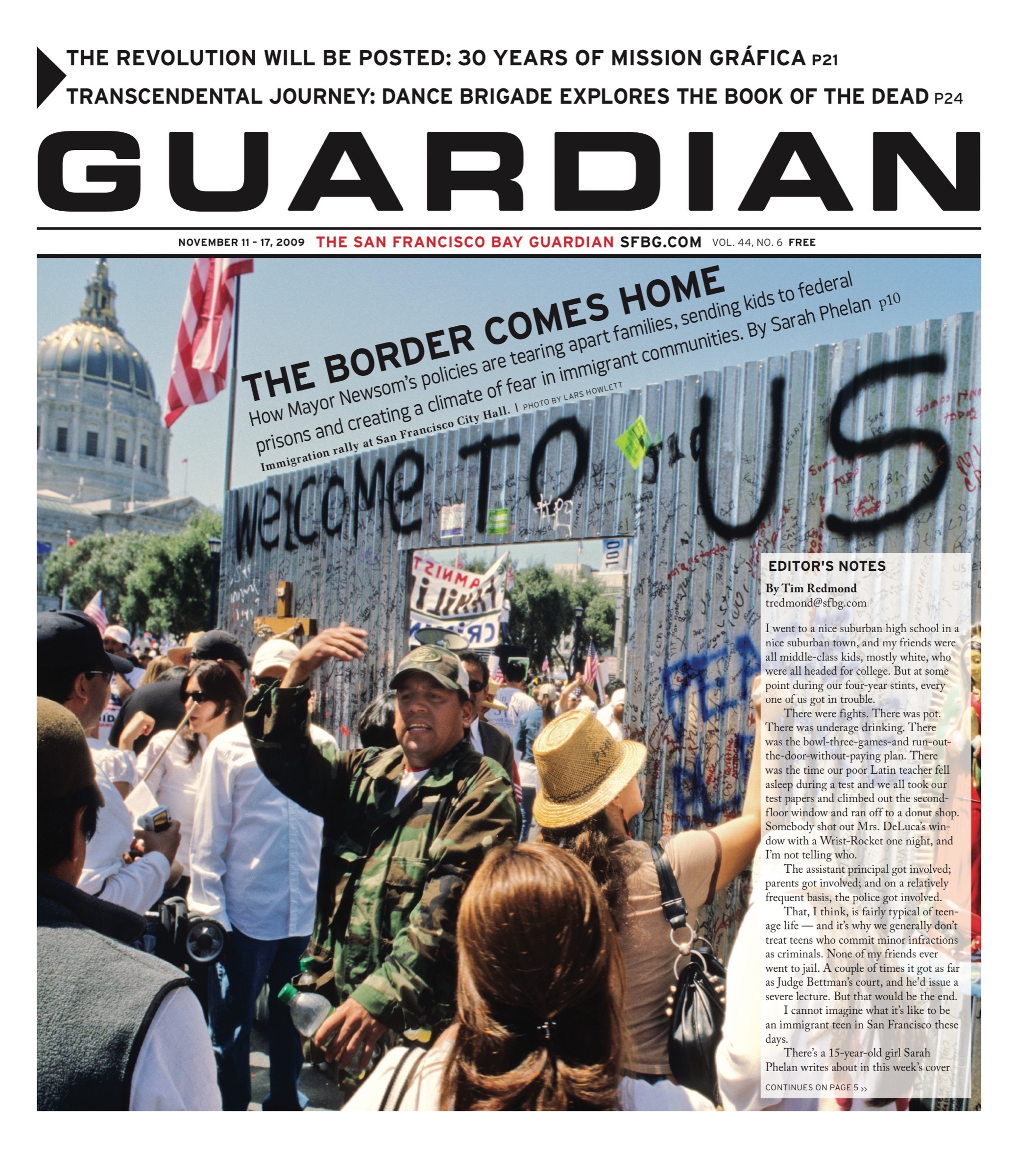Mayor Gavin Newsom’s mid-December decision to announce — on YouTube — that he planned to introduce legislation to protect San Francisco renters from foreclosure-related evictions has outraged tenants rights organizations.
They say Newsom is trying to undermine a much stronger bill by Sup. John Avalos that would give thousands of tenants in newer buildings the same protections as tenants in buildings constructed before 1979.
The mayor’s bill is a classic piece of politics — stealing some of the limelight and giving political cover to mayoral candidate Sup. Bevan Dufty, who voted against Avalos’ package but doesn’t want to be seen as anti-tenant.
This way Newsom and Dufty can enthusiastically support a bill that won’t offend as many landlords — while the mayor vetoes a more robust tenant-protection measure.
Dufty’s decision to side with Sups. Michela Alioto-Pier, Carmen Chu, and Sean Elsbernd in voting Dec. 8 against Avalos’ just-cause legislation gave Newsom veto power over a package that would have empowered thousands of renters.
The Avalos legislation seeks to extend just-cause eviction requirements and protections to tenants in units that are not now subject to eviction controls, which includes most residential rental units built after June 13, 1979. That’s when the city’s current rent control law took effect — and as part of a compromise needed to get the votes for that law, its framers agreed to exempt all “newly constructed” housing.
Newsom’s proposal would only protect those tenants from one category of evictions.
While Newsom promised to introduce his counter-proposal Dec. 15, nothing has come from the Mayor’s Office of Housing so far, fuelling suspicions that the legislation is in fact being drafted by Michael Yarne, a former developer who now works for the Mayor’s Office of Economic and Workforce Development.
Asked Dec. 16 if the Mayor’s Office has submitted any tenant protection legislation, mayoral spokesperson Joe Arellano e-mailed the Guardian, “Not yet. Still ironing out a few details.”
‘OUTRAGEOUS’
In his YouTube address, Newsom said he was committed to vetoing the Avalos legislation, which he claimed was “well-intended” but “went too far.”
His alternative, Newsom said, would protect tenants from the “predatory nature of banks” and “other circumstances” related to “macroeconomic challenges.”
Sara Shortt, executive director of the Housing Rights Committee of San Francisco, described Newsom’s play as “outrageous.”
“The mayor is essentially stealing a bill that came out of the community, watering it down and taking credit for other people’s work,” she said.
“Probably the most frustrating part of this is that there was no attempt to work with any of us,” Shortt added.
As Shortt notes, if Avalos’ legislation doesn’t pass, tenants in at least 10,000 rental units that have come onto the market since 1979 will be left without just-cause eviction protection. That means they can be tossed out for almost any reason.
Shortt’s estimate includes 1,900 units at Trinity Place, 113 units at 430 Main St., 308 units at 333 Harrison St., 113 units built by the Emerald Fund in the Castro District, 192 recently completed units at Strata in Mission Bay, 179 units at 1 Polk St., 720 units at 1401 Market St., 52 units at 818 Van Ness Ave., 5,679 units at Park Merced, and 720 units at Archstone, 350 Eighth St.
But her estimate doesn’t factor in the thousands of potential rentals in the pipeline for Treasure Island, the Candlestick Point shipyard development and the old Schlage Lock site.
Facing a mayoral veto and unwilling to leave tenants without any hope, Avalos introduced an amended version of his just-cause evictions package that addressed Dufty’s concerns about unintended consequences during the board’s Dec. 15 meeting.
“Dufty said he was worried that if someone was in the military and was sent to Afghanistan or decided to go to Harvard to finish their master’s and then wanted to return to their apartment, they’d have to pay a relocation benefit,” Avalos legislative aide Raquel Redondiez explained.
So Avalos amended his legislative package to provide an owner the option of giving additional notice in lieu of making relocation payments for owner move-in eviction of a newly converted single-family home or individually-owned condominium, provided the tenant was initially given specified notice of this status.
The amended bill would also allow eviction from a condominium unit with separable title that had been rented by the developer for a limited time prior to sale of the unit, when the developer has given specified advance notice to the renters.
But Dufty still voted against the amended legislation.
Dufty’s legislative aide Boe Hayward claimed the office didn’t cut a deal with Newsom. “We heard Newsom was interested in introducing legislation but we haven’t seen a draft,” Hayward said. “Michael Yarne mentioned it.”
NO DATA
Hayward told the Guardian that part of Dufty’s problem was an absence of data to support advocates’ claims that people in non-rent-controlled units are being evicted without cause.
“I’ve heard anecdotally that this has happened, but I’ve never seen anyone testify that this has happened,” Hayward said.
He also said Dufty wants Avalos to sit down with small property owners and the San Francisco Apartment Association to hear their concerns.
Shortt acknowledged that such data is hard to come by, but noted that this data gap occurs precisely because there is currently no reporting requirement for evictions that occur in buildings built after June 1979.
“For folks in non-rent-controlled units, it’s like the Wild West,” she said. “Landlords can say ‘I want you out’ and they don’t have to give a reason.
“Right now, such evictions are perfectly legal,” Shortt added, noting that part of the benefit of Avalos’ proposed legislation is that these evictions would be tracked and monitored in future.
She said the mayor’s alternative doesn’t address the larger problem. “While foreclosures are a huge piece of the problem, they are not all of it. There is all this new construction going on. And now that the housing market has turned, units that are either being built or temporarily marketed as rentals, not condos. We’re gaining more units without protections. We can’t just turn a blind eye and say there is no problem and wait for a crisis.”
Dufty told the Guardian that he voted Dec. 15 against Avalos’ amended proposal because “small property owners weren’t invited to the table to dialogue. There needs to be more dialogue between tenant advocates and property owners to come to common ground.”
He said owners are already keeping thousands of rent-controlled units off the market and fears they’ll do the same with post-1979 units. “I don’t want to legislate to the extremes and create a ripple effect where post-1979 units are kept off the market. I’m trying to find ways for folks to rent out their units.” Dufty also said he hadn’t seen the mayor’s proposed legislation.
Shortt said she doesn’t understand what Dufty hopes to achieve by convening landlords and tenant groups. “I feel like we’ve made it clear where we’re willing to go on this, and I can’t imagine anything the San Francisco Apartment Association or others might say that would convince us otherwise. Maybe it’s just a torture technique.”
————–
PROTECTING FAMILIES FROM EVICTIONS
Another major tenant protection bill — Sup. Eric Mar’s legislation to protect families from owner move-in evictions — is headed to the full Board of Supervisors in January. The legislation follows what Mar calls “a couple of minor tweaks” during a Dec. 14 Land Use Committee hearing that took place after months of vetting his bill with the public and family, tenant, and landlord advocacy groups.
The bill seeks to protect families with children from eviction through the OMI process, but would preserve the right of a landlord’s family to evict a tenant’s family, Mar explained.
“During these challenging economic times, our city needs to do whatever it can to ensure that our families are able to live and work here,” Mar said. “This legislation will help our city protect one of our most vulnerable populations: families with children.”
During the hearing, Mar observed that San Francisco is the third most expensive county in the nation for renters and that rent-controlled housing, which encompasses about 70 percent of the city’s rental housing stock, contributes to maintaining a balanced city.
“When a rent-controlled unit is vacated voluntarily or through eviction, the landlord can bring the rental property up to current market rate, making these units unaffordable for our working class and low-income families,” Mar said.
Ted Gullicksen, executive director of the San Francisco Tenants Union, said children need to be protected from no-fault evictions.
“San Francisco protects seniors and other vulnerable tenants from no-fault evictions like the so-called owner move-in eviction,” Gullicksen observed. “We see many families with children being evicted in San Francisco, too often resulting in the family being forced to leave the city where their children were born.”
Advocates say the problem is serious. “We see families flee San Francisco every year due to evictions such as owner move-ins,” said Chelsea Boilard, family policy and communications associate at Coleman Advocates for Children.
Representatives for the San Francisco Apartment Association and other landlord groups spoke out against Mar’s proposal, arguing that anyone with children would have a permanent protection and raising similar objections to ones raised in hearings on Sup. John Avalos’ just-cause legislation.
By the meeting’s end, Mar had amended his legislation to address concerns around the definition of “custodial parent,” including the worry that a 19-year-old could sublease a room to a 16-year-old pretending to be the “custodial parent.”
But Sup. Sophie Maxwell came out against Mar’s amended proposal, which is headed to the full board in January at the recommendation of Mar and Board President David Chiu. All three supervisors sit on the Land Use committee.
“I’m not comfortable with a yes on this legislation,” Maxwell said. “I think we need a comprehensive look at our rental laws and what we need to do. Otherwise, we’ll end up with a hodgepodge.” (Sarah Phelan)












